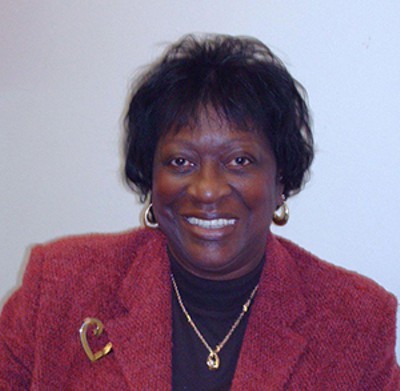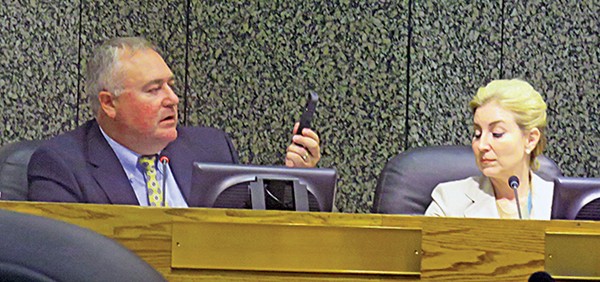At one point in the Shelby County Commission’s crash session on aspects of school financing on Monday, the subject of charter schools came up amid a discussion of whether closing schools actually saved taxpayer money.
Shelby County Schools (SCS) Chair Teresa Jones noted wanly that, while her board can decide on school closures for financial reasons — and has done so frequently — it has no such authority over charter schools, regarding which the Tennessee Board of Education is now the principal overseer, thanks to actions of the Tennessee General Assembly.
That part of the conversation was a reminder of the degree to which local control of public school education has succumbed to the dictates of state government, like so much else that used to be the prerogative of local jurisdictions — control of firearms in municipal parks, for example, or the right to impose wage and anti-discrimination standards in the public sphere.
But nowhere has what many see as the quashing of local choices been more pronounced than in the administration of public education. One of the premises of SCS Superintendent Dorsey Hopson‘s recent request of the county commission for an additional $14.9 million funding had to do with the interruptions and diversions in state outlays caused by the hodge-podge of overlapping of school types and districts that — for better or for worse — have transformed the landscape of local education.
It may sound progressive and civic-minded when one state school official, such as Candice McQueen, the recently named Tennessee Commissioner of Education, speaks in Memphis on Monday about a new abundance of “choices,” and it may sound decisive when another, Chris Barbic, head of the state’s Achievement School District, boasts that his efforts to revamp student results in the “failing” schools he administers (a majority of which are in Memphis) are not answerable to any potentially troublesome school board. But the reality in both cases is that local control of education, once a given, has been pre-empted.
The aforementioned session held on Monday by the county commission, in tandem with SCS officials, was largely about the dislocations caused by this shift in responsibility, and a key component of that discussion was the allegation that Nashville has been consistently short-changing the several school districts of Shelby County of the funding levels required by the state’s own Basic Education Program (BEP).
The problem is not Shelby County’s alone. Back in March, the Hamilton County (Chattanooga) Board of Education, after meeting in the state capital with representatives of Tennessee’s other major urban school districts, including SCS, filed suit against the state in Nashville Chancery Court, contending that the state’s underfunding of BEP-ordained levels amounts to the better part of a billion dollars and “shifts the cost of education to local boards of education, schools, teachers, and students, resulting in substantially unequal educational opportunities across the state.”
That, in a nutshell, is the issue that confronts SCS and the county’s six municipal school districts, as well as Shelby County government, which has responsibility for making up the deficits in school funding.
Whatever the result of this legal action, the ever-aggrandizing state educational apparatus, the governor’s office, and the General Assembly have been put on notice.
· More from that crash session on Monday: Public school education in Shelby County may never again become the political football it was during the years of merger/de-merger controversy, but it’s begun to move in that direction again, for purely budgetary reasons.
Not quite two weeks after a request for additional funding by SCS Chief Hopson that occasioned a reaction from Shelby County Commission members that several observers described as a “love-fest,” the thrill is definitely gone, and the $14.9 million add-on money sought by Hopson now looks like so much pie in the sky — in a very overcast sky, at that.
The meeting was called by commission budget Chair Heidi Shafer to re-examine the issue of school funding in general (and funding in relation to three initialized considerations — BEP, OPEBs, and MOE — in particular). Shelby County Mayor Mark Luttrell — who attended the meeting and, along with his CAO, Harvey Kennedy, and CFO, Mike Swift, intervened at key moments — laid it on the line, bluntly: “We cannot afford $18 million [the amount of Hopson’s request, plus an additional amount that would be routed by average-daily-attendance (ADA) formula to the county’s municipal schools].”
Luttrell topped that by adding, as an aside to SCS representatives on hand, “You might try looking at lay-offs.”
One of the issues, clearly, is the mayor’s concern that his proposed 2015-2016 budget of $1.18 billion, which must be acted on by the commission before the fiscal-year deadline of July 1st has been squeezed down to a level that avoids the need for a tax increase this year — although subsequent teasing by various county hands has revealed a de facto surplus of $6 million that is theoretically available for ad hoc needs.
That yields another issue, one alluded to even at the aforementioned love-fest of May 6th — the fact that SCS officials have chosen not to tap that $178 million fund balance of theirs to cover the projects they want paid for.
School officials have accounted for this reluctance in various ways — some roundabout, some not, some (in defense of maintaining a healthy reserve) even common-sensical — but commission members seem much less inclined to indulge SCS on the point than they were two weeks ago.
Commissioner David Reaves, a former SCS board member himself, put it straightforwardly to the various representatives of SCS — CFO Alicia Lindsey and members Teresa Jones (chair), Kevin Woods (vice chair), and Chris Caldwell (SCS budget chair) — who spent the better part of three hours fielding inquiries from the commission.
Said Reaves: “The reality is, how do you justify having that much money in a savings acccount and asking for $18 million? It’s tough to justify.”
Commissioner Walter Bailey, arguably the most lenient commission member on budgeting for schools, asked the SCS reps a series of questions designed to establish the point that they had already cut their ambitions for next year’s budget to the bone. But he got very little backup from other commission members, even the most SCS-friendly among them.
Clearly, the likelihood is that SCS will be forced to scale back its monetary request — much of which is being sought to keep up funding for various educational strategies that were formerly taken care of by expired or expiring grants from the Gates Foundation and the Race to the Top federal competition won by Tennessee.
The fate of SCS’ fund request was really just a sideshow to the meeting’s main purpose — which was to look critically at the county’s school-funding predicament vis-à-vis the aforementioned alphabetized issues: the BEP; OPEBs (Other Post-Employment Benefits), meaning the benefits contractually owed to retirees in addition to pensions; and MOE (maintenance-of-effort funding), the educational-spending minimums prohibited by the state from being reduced for any reason other than drops in student numbers.
It was on the matter of OPEBs that Luttrell had become most didactic, pointing out that, while county government had seen the writing on the wall regarding the escalating unaffordability of such costs, “others had not,” and he specified SCS as a major procrastinator. Memphis, too, had belatedly begun to reduce OPEB costs, almost to the vanishing point, and he suggested SCS did the same.
County Financial Officer Swift turned the screw a little tighter, noting that at current levels of obligation, OPEB expenses would be costing SCS something like $94 million annually — a sum which, he said with classic understatement, did not seem “feasible.”
The status of MOE obligations on Shelby County government at large was treated as a related phenomenon, but any hopes of getting to the bottom of it were fairly well scotched by a consensus view of the administration and county attorneys that MOE amount for a given jurisdiction were predicated on the third year of a scheduled spending cycle — the latest of these beginning with the de-merger brought about by the creation of six suburban school districts.
The commission will give all these matters another go-round on Wednesday, its regular committee day.
 Jackson Baker
Jackson Baker  Jackson Baker
Jackson Baker  JB
JB 
 Jackson baker
Jackson baker 